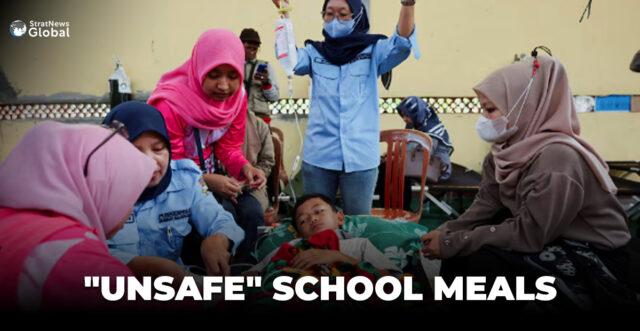Indonesia’s food and drug agency reported on Wednesday that over 9,000 children have suffered food poisoning from free school meals this year, a higher figure than previously disclosed, prompting lawmakers to call for improved safety standards.
The food poisoning cases have caused public outcry, and health organisations have called for the suspension of President Prabowo Subianto’s $10 billion free school meals programme. Prabowo has defended it, saying the percentage of those affected was small.
“Yes, there were shortcomings, food poisoning. We counted all the meals served; the deviation, the deficiency, or error represents 0.00017%,” he said at a political party event.
Prabowo said the programme, which aims to prevent childhood stunting, has improved nutrition for many children and created jobs as well as opportunities for local farmers and fishermen to sell produce.
“This doesn’t mean we’re satisfied. But a human endeavour of this magnitude has never been undertaken before, I think, in the history of the world. It took Brazil 11 years to reach 40 million recipients,” he said.
The government said previously that 6,000 children had suffered from food poisoning.
Over 100 Food Poisoning Cases
Indonesia’s food and drug agency told a parliamentary hearing there were 103 food poisoning cases, affecting 9,089 children from January until September.
“In August, from the end of July, the cases really spiked,” Taruna Ikrar, the agency’s head, told the hearing, adding that problems stemmed from the kitchens cooking the food. Most kitchens involved in food poisoning cases had only been operating for less than a month, he added.
Based on the agency’s investigations, food poisoning stemmed from the distribution of meals four hours after cooking, improper storage of ingredients and lack of knowledge of food security, Ikrar said.
In the same hearing, Dadan Hindayana, the head of the National Nutrition Agency, which runs the programme, said poisoning cases jumped in the past two months because kitchens were violating standards and operation procedures, such as procuring ingredients four days instead of two days ahead of requirement.
Dadan said from January to September, 6,517 children had food poisoning.
Lawmaker Edy Wuryanto noted only 36 of 8,000 kitchens had earned certification for food hygiene and sanitation, while lawmaker Ade Rizki Pratama urged the government to reduce the number of students served by one kitchen.
(With inputs from Reuters)





